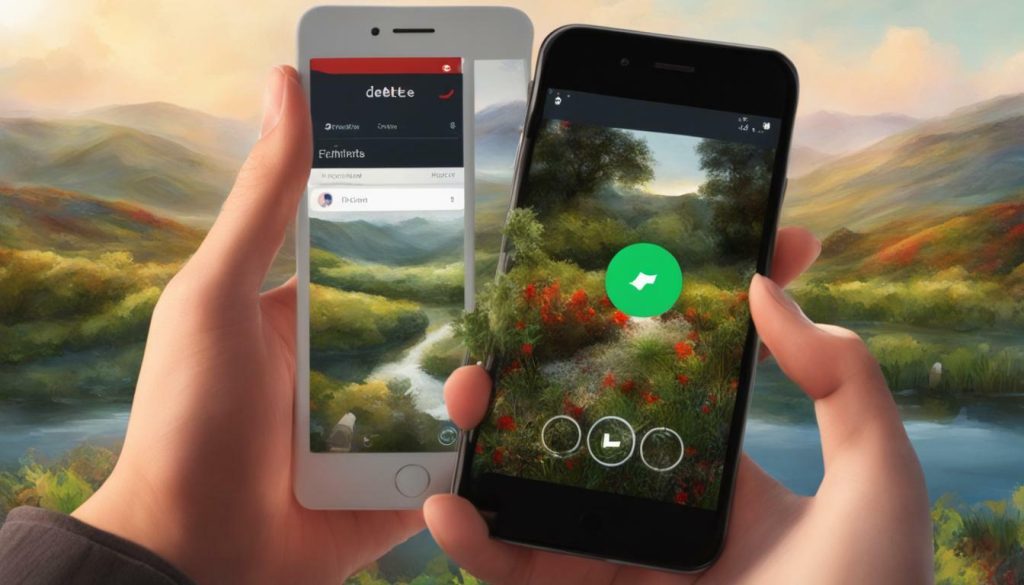Deciding whether or not to delete social media is a personal choice, as it comes with pros and cons. On the positive side, quitting social media can improve happiness, mood, and self-esteem, as it reduces comparison and the fear of missing out. It can also improve focus, provide more time for other activities, reduce stress, and improve mental health. Additionally, deleting social media can increase privacy and protect personal information. However, there are also cons to consider. Deleting social media can lead to a loss of connection with friends and family, difficulty staying informed, and missing out on important events and opportunities. It can also make it harder to stay in touch with professional contacts and lead to a fear of missing out. Ultimately, individuals should weigh these pros and cons before deciding whether or not to delete social media.
Key Takeaways
- Deleting social media can improve happiness, self-esteem, and mental health.
- It can also increase privacy and protect personal information.
- However, it may lead to a loss of connection with friends and family, difficulty staying informed, and missing out on important events and opportunities.
- It is important to weigh the pros and cons before deciding whether or not to delete social media.
The Benefits of Deleting Social Media
On the positive side, quitting social media can improve happiness, mood, and self-esteem, as it reduces comparison and the fear of missing out. It can also provide a much-needed break from the constant barrage of information and notifications, allowing for increased focus and productivity.
One of the biggest benefits of deleting social media is the positive impact it can have on mental health. Studies have shown that social media can lead to increased feelings of anxiety, depression, and loneliness, as well as contribute to sleep disturbances and decreased self-esteem. By detoxing from social media, individuals can reduce these negative effects and improve their overall well-being.
Creating healthy social media habits is also important, whether or not one decides to delete their accounts. This can include limiting usage, unfollowing negative influencers, and being mindful of the content consumed on these platforms.
Additionally, by deleting social media, individuals can increase their privacy and protection. Social media platforms often collect personal information, which can be used for targeted advertising and even identity theft. Removing personal information from social media can help safeguard against these threats and maintain a sense of privacy.
Overall, the benefits of deleting social media are numerous, including improved mental health, focus, and privacy. By creating healthy habits and taking breaks from social media, individuals can improve their overall well-being and lead happier, more fulfilling lives.
Increased Privacy and Protection
Additionally, deleting social media can have a positive impact on mental health by increasing privacy and protecting personal information. By removing personal information from social media platforms, individuals can reduce their risk of online threats and maintain a sense of privacy. Hackers and cybercriminals often use personal information shared on social media to gain access to bank accounts, email addresses, and other sensitive information. By staying off social media, individuals can limit their digital footprint and protect themselves from potential harm.
Moreover, social media detox can provide a sense of relief and freedom from constant notifications and distractions. It promotes healthy social media habits and encourages individuals to focus on other activities and hobbies that can improve their mental health and well-being. Staying off social media can be challenging at first, but it can be a significant step toward improving one’s mental health and providing a sense of control over personal information.

“Disconnect from the need to be constantly available. Realize that our smartphones are tools, not obligations.” – Anonymous
The Drawbacks of Deleting Social Media
However, there are also cons to consider when deciding whether or not to delete social media. One of the biggest drawbacks is the potential loss of connection with friends and family. Social media provides an easy way to stay in touch, share updates, and maintain relationships, especially with those who live far away or have busy schedules. Without social media, staying connected can become more challenging and require more effort.
Another potential drawback of deleting social media is difficulty staying informed. Social media is often used to share news and events, and without it, it can be harder to stay up to date on what is happening in the world or in one’s community. This can lead to a feeling of being out of the loop or missing important information.
Additionally, deleting social media can lead to missing out on important events and opportunities. Social media is often used to invite people to events, share job openings, and connect with professional networks. Without social media, it can be harder to learn about these opportunities or be invited to participate. This can create a fear of missing out and cause individuals to feel left behind.
Finally, deleting social media can make it harder to stay in touch with professional contacts. Social media is often used for networking and keeping in touch with colleagues, clients, and business partners. Without it, it can be harder to maintain these relationships and stay up to date on professional news and developments.

In conclusion, while deleting social media has its benefits, there are also potential drawbacks to consider. Individuals should carefully weigh these pros and cons before making a decision about whether or not to delete social media. It is important to find a balance that allows for healthy social media habits and connections while also protecting one’s mental health and privacy.
Staying Connected with Friends and Family
Deleting social media can lead to a loss of connection with friends and family. However, there are alternative methods for staying in touch and maintaining relationships. One solution is to schedule regular phone calls or video chats, as these can be more meaningful and personal than social media interactions. Another option is to plan in-person gatherings or activities, which can create lasting memories and strengthen relationships.
It’s important to communicate openly with loved ones about why you’ve chosen to delete social media and how you plan to stay connected. This can prevent misunderstandings and help them understand your decision.
Additionally, consider joining clubs or organizations related to your hobbies or interests. This can provide opportunities to make new friends and connect with like-minded individuals in a more meaningful way.
Although it can be challenging to stay connected without social media, it is possible with effort and intentionality. By prioritizing personal relationships and maintaining open communication, individuals can maintain meaningful connections with friends and family.

Staying Informed and Not Missing Out
Difficulty staying informed and missing out on important events and opportunities are potential challenges of deleting social media. However, there are alternative ways to stay informed and connected without social media.
One option is to subscribe to newsletters or RSS feeds from news sources or organizations of interest. This ensures that important news and updates are delivered directly to your inbox or feed reader. Additionally, attending events in person or joining local groups can provide opportunities to stay informed and connected with others.

It’s also important to maintain open communication with friends and family to ensure that important events and milestones are not missed. Scheduling regular check-ins or planning face-to-face meetings can help maintain relationships and ensure that everyone stays up-to-date.
Overall, staying informed and connected simply requires a bit more effort and intentionality without social media. By seeking out alternative sources of information and maintaining open communication, it’s possible to stay informed and avoid missing out on important events and opportunities.
Balancing Personal and Professional Connections
While deleting social media can have many benefits, it can also make it harder to stay in touch with professional contacts and lead to a fear of missing out. Without social media, it may be more challenging to network and keep up with industry news and events.
However, there are alternative ways to maintain professional connections without social media. Consider attending industry events, joining professional organizations, and reaching out to colleagues through email or phone. By being proactive and intentional in networking, you can create valuable connections and opportunities.
It’s also important to recognize the potential for a fear of missing out (FOMO) when staying off social media. This feeling can stem from the fear of not being aware of important information or missing out on social events. It’s important to remember that social media is not the only source of information and events. Being intentional in seeking out information and opportunities can help alleviate FOMO.

“Being connected is being informed.” – Tim Cook
Making an Informed Decision
Ultimately, individuals should weigh these pros and cons before deciding whether or not to delete social media. If you are considering quitting social media, there are some practical steps you can take to make an informed decision.
The first step is to evaluate your current social media usage. Are you spending excessive amounts of time on social media? Are you using it as a way to escape from real-life problems? If so, it may be time to consider taking a break or deleting social media altogether.
Another factor to consider is the impact of social media on your mental health. Are you experiencing negative emotions or feelings of inadequacy after using social media? If so, deleting social media may be a positive step towards improving your well-being and mental health.
It’s also important to consider alternative ways to stay connected with friends and family, as well as alternative sources for staying informed and not missing out on important events. This can include scheduling regular phone calls or video chats with loved ones, signing up for email newsletters or subscribing to news websites, and attending events in person.
If you do decide to delete social media, it’s important to take a gradual approach. Consider starting with a short break or a social media detox to help ease into the transition. You may also want to inform your friends and family of your decision, so they can stay connected with you through other means.
Ultimately, the decision to delete social media is a personal one that should be based on your individual needs and priorities. By weighing the pros and cons and taking a thoughtful approach, you can make an informed decision that is right for you.

The Importance of Healthy Social Media Habits
Regardless of the decision to delete social media or not, it is important to develop healthy social media habits. This means finding a balance between usage and other activities, setting limits on daily screen time, and taking regular breaks. It also means being mindful of the content consumed and the impact it has on mental health.
One way to promote healthy social media habits is to practice a social media detox. This involves taking an extended break from social media, such as a weekend or a week, in order to recharge and refocus on other priorities. During this time, individuals can engage in activities that have been put off due to excessive social media usage, such as exercise, reading, or spending time with family and friends in person.
Another important aspect of healthy social media usage is to be aware of social media addiction. This is characterized by excessive usage and a preoccupation with social media, leading to neglect of other areas of life. Signs of addiction include compulsive checking of social media, difficulty focusing on other tasks, and a sense of unease or anxiety when away from social media.
To avoid social media addiction, individuals can set boundaries for themselves, such as limiting usage to certain times of the day or turning off notifications. They can also engage in alternative activities when the urge to check social media arises, such as meditation or taking a walk outdoors.

“Healthy social media habits involve finding a balance between usage and other activities, setting limits on daily screen time, and being mindful of the content consumed and the impact it has on mental health.”
Finally, it is important to remember that social media is just one aspect of life and should not be the sole source of connection, validation, or inspiration. By developing a healthy relationship with social media, individuals can enjoy the benefits without sacrificing their mental health or well-being.
Conclusion
In conclusion, when deciding whether or not to delete social media, it is crucial to weigh the pros and cons, consider personal priorities, and make a well-informed decision. Deleting social media can have numerous benefits such as improved happiness, mood, self-esteem, focus, time management, and mental health. It can also increase privacy and protect personal information. However, it is important to keep in mind that there are also potential drawbacks, such as a loss of connection with friends and family, difficulty staying informed, and missing out on important events and opportunities.
It is important to balance the benefits and drawbacks when considering whether or not to delete social media. If an individual decides to stay off social media, it is important to explore alternative methods for staying connected with friends and family, staying informed, and maintaining professional contacts. It is also important to maintain healthy social media habits and take regular social media detoxes, regardless of whether or not one chooses to delete social media completely.
Ultimately, the decision to delete social media should be based on personal priorities and the impact of social media on one’s overall well-being. By carefully considering the pros and cons, making a well-informed decision, and maintaining healthy social media habits, individuals can find a healthy balance with social media in their lives.
FAQ
A: Deciding whether or not to delete social media is a personal choice, as it comes with pros and cons. It ultimately depends on your individual priorities and how social media affects your well-being.
A: Deleting social media can improve happiness, mood, self-esteem, focus, time management, and mental health. It can also increase privacy and protect personal information.
A: While deleting social media can make it harder to stay connected, there are alternative methods for maintaining relationships. Open communication and active efforts to stay in touch can help bridge the gap.
A: Without social media, it’s important to be proactive and seek out information from alternative sources such as news websites, event newsletters, or direct communication with friends and family.
A: Deleting social media can make it more challenging to stay in touch with professional contacts and network. It’s important to consider alternative networking strategies and maintain open communication with colleagues and industry peers.
A: To make an informed decision, evaluate your personal usage, assess the impact of social media on your mental health, and consider alternative ways to stay connected and informed. Reflect on your priorities and what aligns best with your well-being.
A: Whether you choose to delete social media entirely or focus on developing healthy habits is up to you. It’s important to find a balance and create a mindful approach to social media usage that aligns with your well-being.
Share this content:






